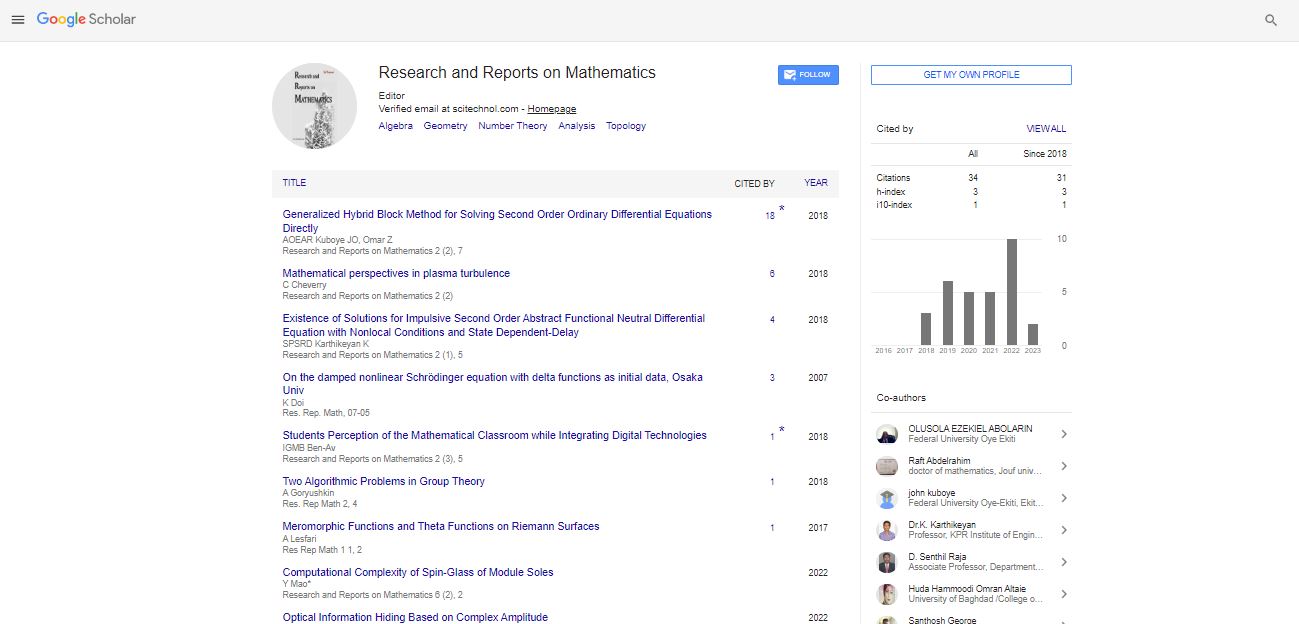Opinion Article, Res Rep Math Vol: 7 Issue: 3
Exploring the Foundations of Mathematical Analysis
Luis Fco*
1Department of Mathematics, Pontifical Comillas University, Madrid, Spain
*Corresponding Author: Luis Fco,
Department of Mathematics, Pontifical
Comillas University, Madrid, Spain
E-mail: luis.fco@ponti.edu
Received date: 28 May, 2023, Manuscript No. RRM-23-106842
Editor assigned date: 31 May, 2023, Pre QC No. RRM-23-106842 (PQ);
Reviewed date: 14 June, 2023, QC No. RRM-23-106842
Revised date: 22 June, 2023, Manuscript No. RRM-23-106842 (R);
Published date: 28 June, 2023, DOI: 07.4172/rrm.1000193
Citation: Fco L (2023) Exploring the Foundations of Mathematical Analysis. Res Rep Math 7:2.
Description
Mathematical analysis forms the bedrock of modern mathematics and serves as a fundamental framework for understanding and solving complex mathematical problems. It encompasses a broad range of concepts, including limits, continuity, differentiation, integration, and series. Discussing the foundations of mathematical analysis provides an essential stepping stone for developing a deeper understanding of calculus and its applications in various fields. In this study, we will discuss the key principles and ideas that underpin mathematical analysis, highlighting their significance and discussing their applications.
At the heart of mathematical analysis lies the concept of limits. A limit is a fundamental notion that captures the behavior of a function as its input approaches a certain value. By understanding how a function behaves near a specific point, mathematicians can uncover essential properties and draw valuable conclusions. The concept of a limit is the cornerstone of calculus and enables us to tackle problems involving rates of change, continuity, and approximation.
Continuity, a essential aspect of mathematical analysis, refers to the smoothness and connectedness of a function. A function is continuous if its graph has no breaks or jumps. Continuity allows us to analyze the behavior of functions in a holistic manner, ensuring that small changes in the input result in small changes in the output. This property is vital in many real-world applications, such as modeling physical phenomena or optimizing systems.
Differentiation, a powerful tool in mathematical analysis, provides insights into the instantaneous rate of change of a function. It enables us to compute derivatives, which represent the slope of a function at any given point. Derivatives have numerous applications, ranging from determining maximum and minimum points of a function to modeling rates of change in physics, economics, and other fields.
The fundamental theorem of calculus establishes a deep connection between differentiation and integration, opening the door to solving complex problems through both processes. Integration, another fundamental concept in mathematical analysis, allows us to compute the accumulation of quantities over a given interval. It involves finding the area under a curve or determining the total change in a system. Integrals have diverse applications in various scientific disciplines, including physics, engineering, and economics. They enable us to calculate quantities such as displacement, area, volume, and accumulated rates.
Series, an essential part of mathematical analysis, deals with the summation of infinitely many terms. Infinite series can converge to a specific value or diverge, depending on their behavior. The study of series encompasses various techniques, such as geometric series, power series, and Taylor series expansions. These tools are indispensable in approximating functions, solving differential equations, and investigating the behavior of complex mathematical structures.
Mathematical analysis is not limited to its theoretical foundations but also finds widespread applications in diverse fields. In physics, for example, it underpins the laws of motion, electromagnetism, and quantum mechanics. In economics, analysis techniques enable the modeling of supply and demand, market equilibrium, and optimization problems. Engineers rely on mathematical analysis to design efficient structures and systems, ensuring their stability and performance. Moreover, mathematical analysis plays a essential role in computer science, cryptography, and data analysis, providing the tools for algorithm design, encryption, and statistical modeling.
The exploration of the foundations of mathematical analysis fosters critical thinking, problem-solving skills, and logical reasoning. It trains the mind to break down complex problems into smaller, manageable parts and develop systematic approaches to finding solutions. Mathematical analysis encourages creativity and deepens our understanding of the underlying structures and patterns that govern the world of mathematics.
Exploring the foundations of mathematical analysis is a fascinating journey into the core principles and concepts that underpin modern mathematics. It provides a solid framework for tackling complex mathematical problems, developing models, and gaining insights into various scientific disciplines. The concepts of limits, continuity, differentiation, integration, and series form the building blocks of mathematical analysis, enabling us to solve real-world problems, make predictions, and understand the intricacies of the mathematical universe. By delving into this rich field of study, we unlock a deeper appreciation for the elegance and power of mathematics in shaping our understanding of the world.
 Spanish
Spanish  Chinese
Chinese  Russian
Russian  German
German  French
French  Japanese
Japanese  Portuguese
Portuguese  Hindi
Hindi 